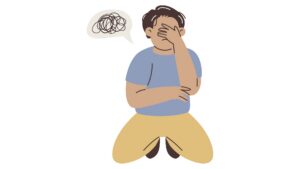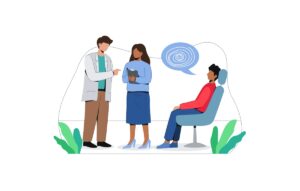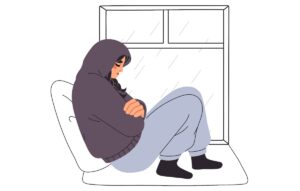Understanding ADHD and Common Symptoms
ADHD symptoms in children can include difficulty focusing, acting impulsively, or struggling to sit still. While these symptoms are hallmark indicators of ADHD, they also overlap with other neurodivergent conditions and various mental health issues. According to the National Library of Medicine, some children are diagnosed with ADHD when other issues may be at play, such as anxiety, depression, or learning disorders. An accurate diagnosis is key to creating an effective treatment plan for your child’s well-being.
Conditions Commonly Mistaken for ADHD
ADHD symptoms can appear similar to those of other behavioral and psychological conditions, which can lead to a misdiagnosis. For instance:
- Anxiety Disorders: Children with anxiety might appear restless, have trouble focusing, or avoid certain tasks—all behaviors that mimic ADHD.
- Sensory Processing Disorders: If a child struggles to process sensory input, they might become overwhelmed in busy environments and have difficulty focusing, similar to ADHD symptoms.
- Sleep Disorders: Poor sleep can affect concentration and mood, making it hard for a child to engage at school or focus on tasks. If sleep issues are overlooked, symptoms might be attributed to ADHD.
- Learning Disabilities: Learning disabilities often co-occur with ADHD, but they can also mimic ADHD. A child struggling to keep up academically may seem distracted or frustrated, leading to a mistaken diagnosis.
These overlapping symptoms show that a thorough evaluation is crucial. Without it, behaviors rooted in executive dysfunction and emotional overload may be mistaken for ADHD, leading a child to receive treatment that doesn’t fully address the underlying issue and causing confusion and frustration for both the child and their parents.
Factors Contributing to ADHD Misdiagnosis
The process of diagnosing ADHD can sometimes overlook other causes for attention-related symptoms. Several factors may contribute to this:
- Quick Assessments: ADHD is sometimes diagnosed after brief assessments, without the comprehensive evaluations needed to rule out other conditions. Without taking a full medical history, including sleep habits and emotional stressors, the risk of misdiagnosis increases.
- Classroom Pressures: In school, children are expected to concentrate and behave in specific ways, but not all children are ready for such demands. The pressure to fit in academically and socially can lead educators or parents to seek an ADHD diagnosis without exploring other possibilities.
- Behavioral Expectations and Social Comparisons: Every child develops at their own pace, and what might seem like ADHD could be typical childhood behavior. For example, energetic, impulsive behavior can often be managed through lifestyle changes rather than a diagnosis.
These factors underscore the importance of considering the broader context of a child’s behavior before labeling it as ADHD. Given the wide range of neurodivergent traits that children can display, thorough assessments are essential for proper diagnosis and care.
Consequences of Misdiagnosing ADHD
Misdiagnosis has real consequences. When ADHD is diagnosed incorrectly, children may undergo unnecessary treatments or take medications that don’t address the true cause of their symptoms. Some potential impacts of an ADHD misdiagnosis include:
According to the study cited by the National Library of Medicine, children with misdiagnosed ADHD may be prescribed stimulants or other medications that aren’t suitable for their actual needs. This can lead to side effects without any real improvement in their condition.
When the correct condition isn’t identified, children miss out on targeted treatments that could better support them, like anxiety-focused therapies or sleep interventions.
A misdiagnosis can create stress for both children and their families. Parents may feel uncertain about the best path forward, while children may struggle with the side effects of unnecessary treatments.
Getting an Accurate Diagnosis for Your Child
If you suspect ADHD, consider seeking a thorough evaluation that includes input from a range of specialists. Here are some steps to help ensure an accurate diagnosis:
- Comprehensive Evaluation: A full clinical assessment can take into account behavioral history, academic performance, family input, and psychological testing to better understand your child’s unique needs, especially in the context of neurodivergent characteristics.
- Get a Second Opinion: If your child was diagnosed quickly or without thorough testing, a second opinion might offer clarity. Mental health professionals such as psychologists, psychiatrists, and pediatricians can provide valuable perspectives.
- Involve a Multidisciplinary Team: Accurate ADHD diagnosis often benefits from multiple professionals. Teachers, behavioral specialists, and healthcare providers can work together to form a complete picture of your child’s challenges.
Remember, it’s okay to ask questions and advocate for your child’s needs. Understanding the diagnostic process and the options available to you can help you make more informed decisions.
How PRI Treatment Center Can Help
At PRI Treatment Center in La Jolla, CA, we understand that each child’s experience with attention challenges is unique, especially within the spectrum of neurodivergence. Our team uses a comprehensive approach to assess ADHD and other potential conditions, ensuring that children receive the correct diagnosis and the most appropriate treatment for their individual needs. Whether it’s through behavioral therapy, personalized educational support, or family counseling, our goal is to provide solutions that work best for each child.
Contact Protective Roots Integrative Treatment Center Today!
Misdiagnosing ADHD is more common than you might think, but with the right support, you can navigate this complex journey. If you’re concerned about your child’s diagnosis or want a thorough evaluation, reach out to PRI Treatment Center today. We’re here to provide guidance, answer questions, and help you ensure your child receives the support they need to thrive.
References:
- Sadek, J. (2023, October 28). Attention deficit hyperactivity disorder misdiagnosis: Why medical evaluation should be a part of ADHD assessment. Brain sciences. https://pmc.ncbi.nlm.nih.gov/articles/PMC10669410/

Dr. Warter received his doctorate in Clinical Psychology from The Wright Institute in Berkely, California, completed his Predoctoral Internship at USC’s Children’s Hospital Los Angeles, and was a Postdoctoral Researcher at USC’s Institute for Integrative Health and Wellness. Dr. Warter has also been trained at UCSF School of Medicine, Kaiser Permanente, and in community clinics in rural, underserved communities in Argentina and Paraguay. Dr. Warter has received training in providing parents with guidelines to help prevent behavior problems and enhance communication skills and strategies to promote children’s social, emotional, and academic competence. Dr. Warter has also published and presented at the University of Naples and the University of Buenos Aires on subjects related to Third Culture Kids and the impacts of Social Media on Personality and Self Esteem.










